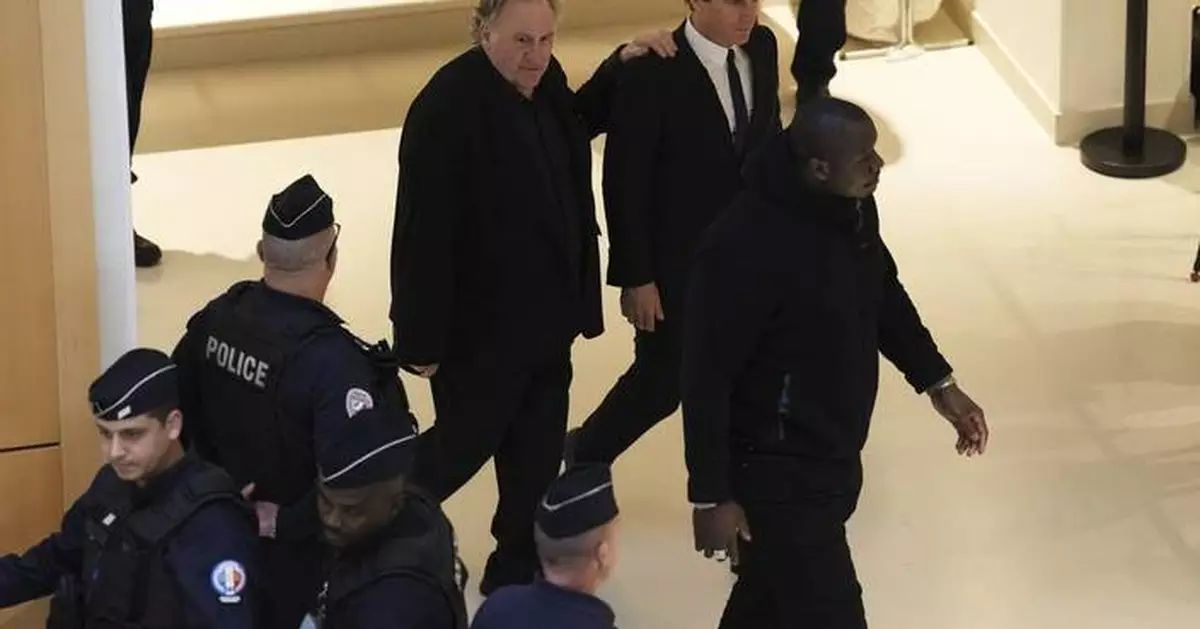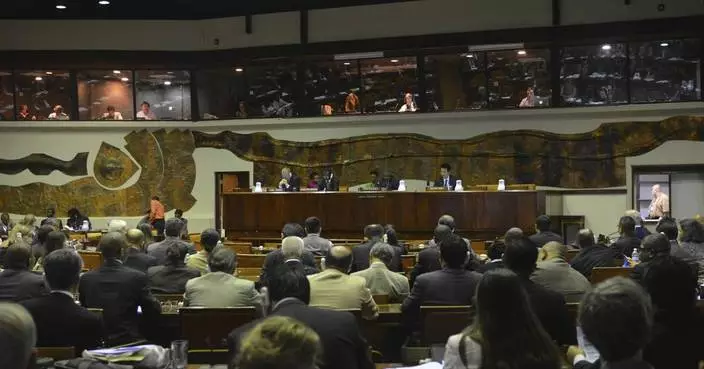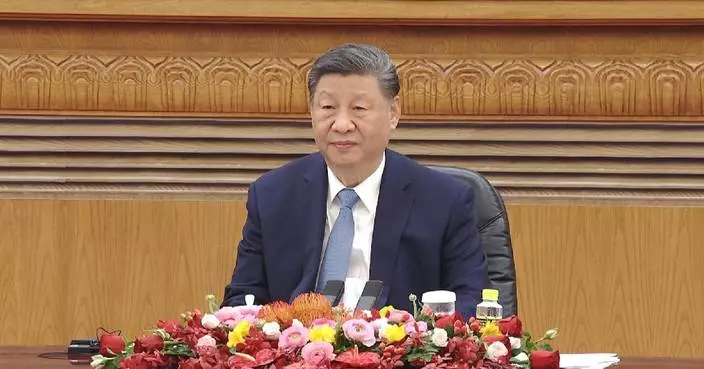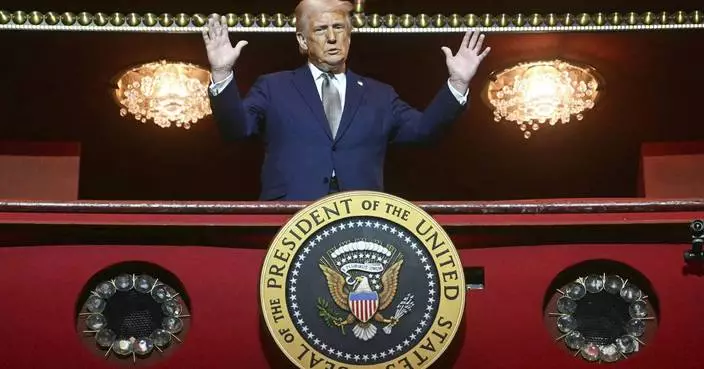PARIS (AP) — With his hulking frame and volcanic charisma, Gérard Depardieu reigned over French cinema for half a century, a national icon as familiar as the baguette.
But this week, the actor who once inspired writer John Updike to lament that “I think that I shall never view a French film without Depardieu” sat slumped in a Paris courtroom.
Click to Gallery
Claude Vincent, a plaintiff's lawyer, answers reporters as part of French actor Gerard Depardieu's trial for the alleged sexual assaults of two women on a film set in 2021, Wednesday, March 26, 2025 in Paris. (AP Photo/Aurelien Morissard)
Claude Vincent, a plaintiff's lawyer, answers reporters as part of French actor Gerard Depardieu's trial for the alleged sexual assaults of two women on a film set in 2021, Wednesday, March 26, 2025 in Paris. (AP Photo/Aurelien Morissard)
French actor Gerard Depardieu returns with his lawyer Jeremie Assous after a break during his trial for the alleged sexual assaults of two women on a film set in 2021, Wednesday, March 26, 2025 in Paris. (AP Photo/Aurelien Morissard)
French actor Gerard Depardieu returns with his lawyer Jeremie Assous after a break during his trial for the alleged sexual assaults of two women on a film set in 2021, Wednesday, March 26, 2025 in Paris. (AP Photo/Aurelien Morissard)
French actor Gerard Depardieu leaves for a break during his trial for the alleged sexual assaults of two women on a film set in 2021, Wednesday, March 26, 2025 in Paris. (AP Photo/Aurelien Morissard)
Actor Gerard Depardieu, center, leaves with his lawyer Jeremie Assous, right, to the courtroom for a break during his trial for the alleged sexual assaults of two women on a film set in 2021, Tuesday, March 25, 2025 in Paris. (AP Photo/Aurelien Morissard)
Actor Gerard Depardieu returns ti the court with his lawyer Jeremie Assous during his trial for the alleged sexual assaults of two women on a film set in 2021, Tuesday, March 25, 2025 in Paris. (AP Photo/Aurelien Morissard)
He faces two counts of sexual assault. If convicted, he could face up to five years in prison and a fine of 75,000 euros ($81,000).
But more than Depardieu is on trial.
For many in France, the case marks a cultural reckoning. Can a nation famed for its culture of seduction — and long criticized for shielding male artists — hold one of them accountable?
Depardieu, 76, is accused of groping two women — a set dresser and an assistant — during the 2021 filming of “Les Volets Verts,” or “The Green Shutters”. According to complaints and witness statements, he trapped one woman with his legs, grabbed her breasts and waist and shouted crude innuendo followed by a vulgar come-on.
He denies all allegations. “Never, but never, have I abused a woman,” he wrote in Le Figaro. “I have only ever been guilty of being too loving, too generous, or having a temperament that is too strong.”
This is the first time one of the more than 20 accusations against him has reached court.
Once a symbol of France’s creative power, Depardieu now represents the nation’s delayed reckoning with #MeToo. The courtroom has become the stage for a country confronting the myths it has told itself about art and powerful men.
Depardieu’s rise was the stuff of legend. Born in 1948 to a working-class family in Châteauroux, he was a stuttering teen with no formal education. He drifted into acting and exploded onto the French stage with “Les Valseuses,” or “Going Places”, a 1974 film so provocative it remains banned in some countries.
A blur of hits followed: “Jean de Florette,” “Cyrano de Bergerac,” “Green Card,” “The Last Metro,” “Danton.” He received a Golden Globe, an Oscar nomination and the adoration of millions. He was messy, magnetic and untouchable.
But the excess was real off-screen, too. He crashed his motorcycle while drunk, accepted a Russian passport from Vladimir Putin during a tax dispute and once urinated in a plane aisle. He boasted of his appetites.
France seemed to cheer them on.
In Hollywood, #MeToo toppled titans. In France, the movement was met with a wary eye. When #BalanceTonPorc, or “Expose Your Pig” emerged in 2017, it rattled the country’s self-image — particularly in the arts, where seduction and transgression had long been celebrated.
Some warned that #MeToo was killing romance. In 2018, screen legend Catherine Deneuve and 99 other prominent French women published an open letter in Le Monde, scolding the movement for going “too far.” They championed la liberté d’importuner — “the freedom to bother” — as a pillar of French life, defending the right of men to pursue women without fear of consequence.
To many, it sounded less like a defense of flirtation than a permission slip for harassment, cloaked in perfume and nostalgia.
Even President Emmanuel Macron echoed the sentiment. In December 2023 — shortly after a documentary aired footage of Depardieu making sexually suggestive comments about a young girl in North Korea — Macron defended the actor on national television, condemning the backlash as a “manhunt.”
“Gérard Depardieu makes France proud,” Macron said.
The remark sparked outrage over the instinct to protect cultural giants, no matter the cost. Weeks later, Macron expressed his “regret” about the comments. It's important “for women who are victims of abuse to speak out," he said.
France’s reluctance to confront sexual misconduct by its stars has long set it apart.
Roman Polanski, convicted of statutory rape in the U.S. and accused by several other women, continues to work and live freely in France. In 2020, his César Award win prompted walkouts but also a standing ovation.
In 2022, Johnny Depp was dropped from Disney's “Pirates of the Caribbean” franchise after domestic abuse allegations by ex-wife Amber Heard. He was largely vindicated.
In France, Depp was embraced. In 2023, he played Louis XV in “Jeanne du Barry,” the opening film at the Cannes Film Festival. Dior kept him on as the face of its Sauvage fragrance.
High-profile convictions in recent months suggest that the shield of fame may finally be cracking.
In February, director Christophe Ruggia was convicted of sexually abusing actress Adele Haenel when she was a child. Actor-director Nicolas Bedos was sentenced in 2024 for sexual assault.
And actor-director Judith Godrèche testified before a parliamentary commission, accusing two renowned directors of exploiting her as a teenager. “This is not about desire,” she told lawmakers. “It’s about power. About silence. About a system that protects itself.”
The commission has since summoned major actors — including Jean Dujardin of “The Artist” fame. Some reportedly asked to testify behind closed doors.
Anouk Grinberg, who appeared in “Les Volets Verts,” has publicly supported the two women accusing Depardieu. “What I saw on set was not seduction,” she said. “It was shameful.”
On Parisian sidewalks, opinions diverge. “We’re losing our culture of flirtation,” said Alain Morel, 62, sipping an espresso near the Arc de Triomphe. “Flirting isn’t a crime — it’s part of who we are.”
But across the street, 28-year-old student Yasmine Bensalem shook her head. “We called it charm,” she said. “But it was always about power.”

Claude Vincent, a plaintiff's lawyer, answers reporters as part of French actor Gerard Depardieu's trial for the alleged sexual assaults of two women on a film set in 2021, Wednesday, March 26, 2025 in Paris. (AP Photo/Aurelien Morissard)

Claude Vincent, a plaintiff's lawyer, answers reporters as part of French actor Gerard Depardieu's trial for the alleged sexual assaults of two women on a film set in 2021, Wednesday, March 26, 2025 in Paris. (AP Photo/Aurelien Morissard)

French actor Gerard Depardieu returns with his lawyer Jeremie Assous after a break during his trial for the alleged sexual assaults of two women on a film set in 2021, Wednesday, March 26, 2025 in Paris. (AP Photo/Aurelien Morissard)

French actor Gerard Depardieu returns with his lawyer Jeremie Assous after a break during his trial for the alleged sexual assaults of two women on a film set in 2021, Wednesday, March 26, 2025 in Paris. (AP Photo/Aurelien Morissard)

French actor Gerard Depardieu leaves for a break during his trial for the alleged sexual assaults of two women on a film set in 2021, Wednesday, March 26, 2025 in Paris. (AP Photo/Aurelien Morissard)

Actor Gerard Depardieu, center, leaves with his lawyer Jeremie Assous, right, to the courtroom for a break during his trial for the alleged sexual assaults of two women on a film set in 2021, Tuesday, March 25, 2025 in Paris. (AP Photo/Aurelien Morissard)
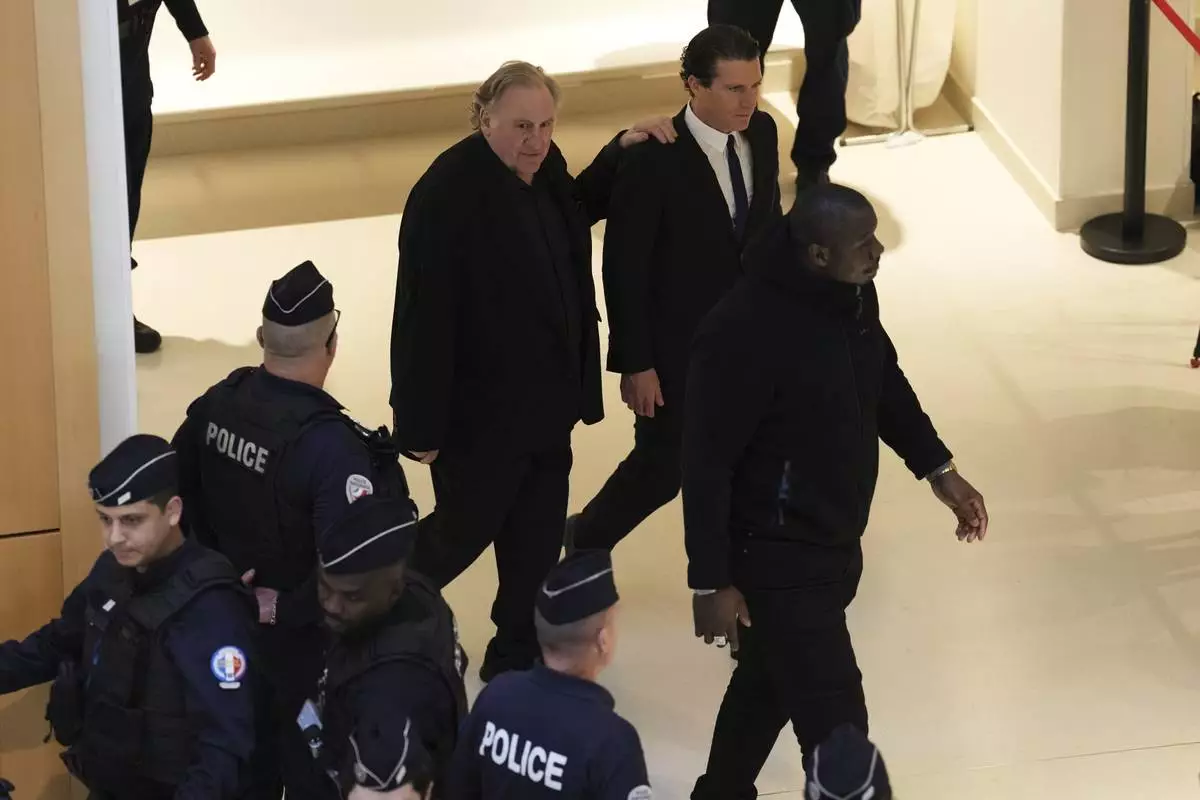
Actor Gerard Depardieu returns ti the court with his lawyer Jeremie Assous during his trial for the alleged sexual assaults of two women on a film set in 2021, Tuesday, March 25, 2025 in Paris. (AP Photo/Aurelien Morissard)
ATLANTA (AP) — President Donald Trump's order accusing the Smithsonian Institution of not reflecting American history notes correctly that the country's Founding Fathers declared that “all men are created equal.”
But it doesn't mention that the founders enshrined slavery into the U.S. Constitution and declared enslaved persons as three-fifths of a person for the purpose of the Census.
Civil rights advocates, historians and Black political leaders sharply rebuked Trump on Friday for his order, entitled “Restoring Truth and Sanity to American History.” They argued that his executive order targeting the Smithsonian Institution is his administration’s latest move to downplay how race, racism and Black Americans themselves have shaped the nation’s story.
“It seems like we’re headed in the direction where there’s even an attempt to deny that the institution of slavery even existed, or that Jim Crow laws and segregation and racial violence against Black communities, Black families, Black individuals even occurred,” said historian Clarissa Myrick-Harris, a professor at Morehouse College, the historically Black campus in Atlanta.
The Thursday executive order cites the National Museum of African American History and Culture by name and argues that the Smithsonian as a whole is engaging in a “concerted and widespread effort to rewrite our Nation’s history.”
Instead of celebrating an “unparalleled legacy of advancing liberty, individual rights, and human happiness,” the order argues that a “corrosive … divisive, race-centered ideology” has “reconstructed” the nation “as inherently racist, sexist, oppressive, or otherwise irredeemably flawed.”
It empowers Vice President JD Vance to review all properties, programs and presentations to prohibit programs that “degrade shared American values” or “divide Americans based on race.”
Trump also ordered Interior Secretary Doug Burgum to determine if any monuments since January 2020 “have been removed or changed to perpetuate a false reconstruction of American history” or “inappropriately minimize the value of certain historical events or figures.” Trump has long criticized the removal of Confederate monuments, a movement that gained steam after the May 2020 murder of George Floyd.
Critics argued the order is the latest move by the Trump administration to quash recognition of Black Americans’ contributions to the nation and to gloss over the legal, political, social and economic obstacles they have faced.
Trump’s approach is “a literal attack on Black America itself,” Ibram X. Kendi, the race historian and bestselling author, said. “The Black Smithsonian, as it is affectionately called, is indeed one of the heartbeats of Black America,” Kendi argued, and “also one of the heartbeats” of the nation at large.
Congressional Black Caucus Chair Yvette Clarke, D-N.Y., suggested that Trump wants to distort the national narrative to racist ends.
“We do not run from or erase our history simply because we don’t like it,” she said in a statement. “We embrace the history of our country – the good, the bad, and the ugly.”
The African American museum, one of 21 distinct Smithsonian entities, opened along the National Mall in 2016, the last year that President Barack Obama held office as the nation’s first Black chief executive. The museum chronicles chattel slavery, Jim Crow segregation and its lingering effects, but also highlights the determination, successes and contributions of individual Black Americans and Black institutions throughout U.S. history.
Former NAACP President Ben Jealous, who now leads the Sierra Club, said museums that focus on specific minority or marginalized groups — enslaved persons and their descendants, women, Native Americans — are necessary because historical narratives from previous generations misrepresented those individuals or overlooked them altogether.
“Attempts to tell the general history of the country always omit too much ... and the place that we’ve come to by having these museums is so we can, in total, do a better job of telling the complete story of this country,” he said.
And, indeed, Trump sounded more like Jealous when he visited the African American museum in 2017, at the outset of his first term, and declared it a national gem.
“I’m deeply proud that we now have a museum that honors the millions of African American men and women who built our national heritage, especially when it comes to faith, culture and the unbreakable American spirit,” Trump said following a tour that included Sen. Tim Scott of South Carolina and then-Housing and Urban Development Secretary Ben Carson, both of whom are Black.
“I know President Obama was here for the museum’s opening last fall,” Trump continued. “I’m honored to be the second sitting president to visit this great museum.”
Trump won his comeback White House bid with a notable uptick in support from non-white voters, especially among younger Black and Hispanic men.
He ratcheted up attacks during his campaign on what he labeled “woke” culture and diversity, equity and inclusion initiatives, not just in government but the private sector. He also used racist and sexist tropes to attack Democratic nominee and Vice President Kamala Harris, the first Black woman and person of South Asian descent to hold national office, and regularly accused her and other liberals of “hating our country.”
Since his Jan. 20 inauguration, Trump has banned diversity initiatives across the federal government. The administration has launched investigations of colleges — public and private — that it accuses of discriminating against white and Asian students with race-conscious admissions programs intended to address historic inequities in access for Black students.
The Defense Department, at one point, temporarily removed training videos recognizing the Tuskegee Airmen and an online biography of Jackie Robinson. In February, Trump fired Air Force Gen. CQ Brown Jr., a champion of racial diversity in the military, as chairman of the Joint Chiefs of Staff. Brown, in the wake of Floyd's killing, had spoken publicly about his experiences as a Black man, and was only the second Black general to serve as chairman.
The administration has fired diversity officers across government, curtailed some agencies' celebrations of Black History Month, and terminated grants and contracts for projects ranging from planting trees in disadvantaged communities to studying achievement gaps in American schools.
Civil rights advocates and historians expressed concern about a chilling effect across other institutions that study Black history.
Kendi noted that many museums and educational centers across the country — such as San Francisco’s Museum of the African Diaspora, The Legacy Museum: From Enslavement to Mass Incarceration in Montgomery, Alabama, and the International African American Museum in Charleston, South Carolina — exist with little to no federal or other governmental funding sources. Some already are struggling to keep their doors open.
“To me, that’s part of the plan, to starve these institutions that are already starving of resources so that the only institutions that are telling America’s history are actually only telling political propaganda,” Kendi said.
Associated Press journalists Aaron Morrison in New York and Gary Fields in Washington contributed to this report.
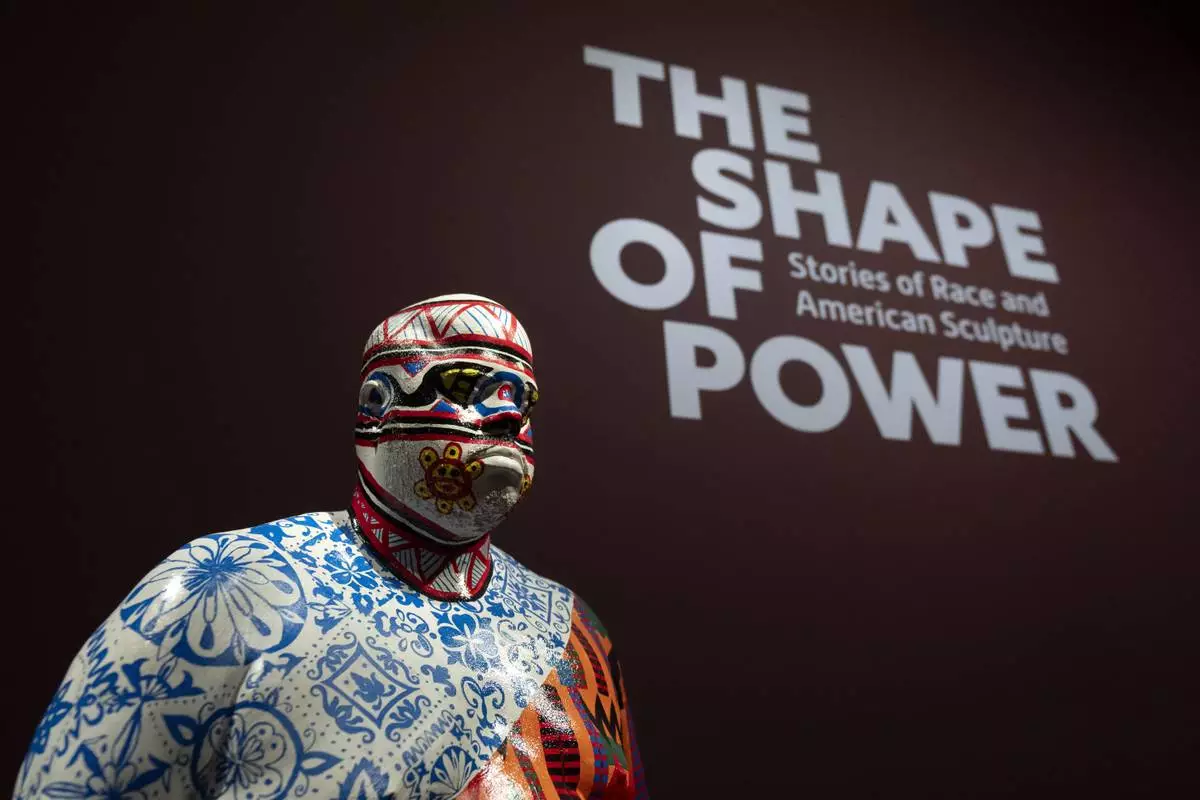
The sculpture DNA Study Revisited by artist Roberto Lugo, part of the exhibition The Shape of Power: Stories of Race and American Sculpture at the Smithsonian American Art Museum, is seen on Friday, March 28, 2025, in Washington. (AP Photo/Mark Schiefelbein)
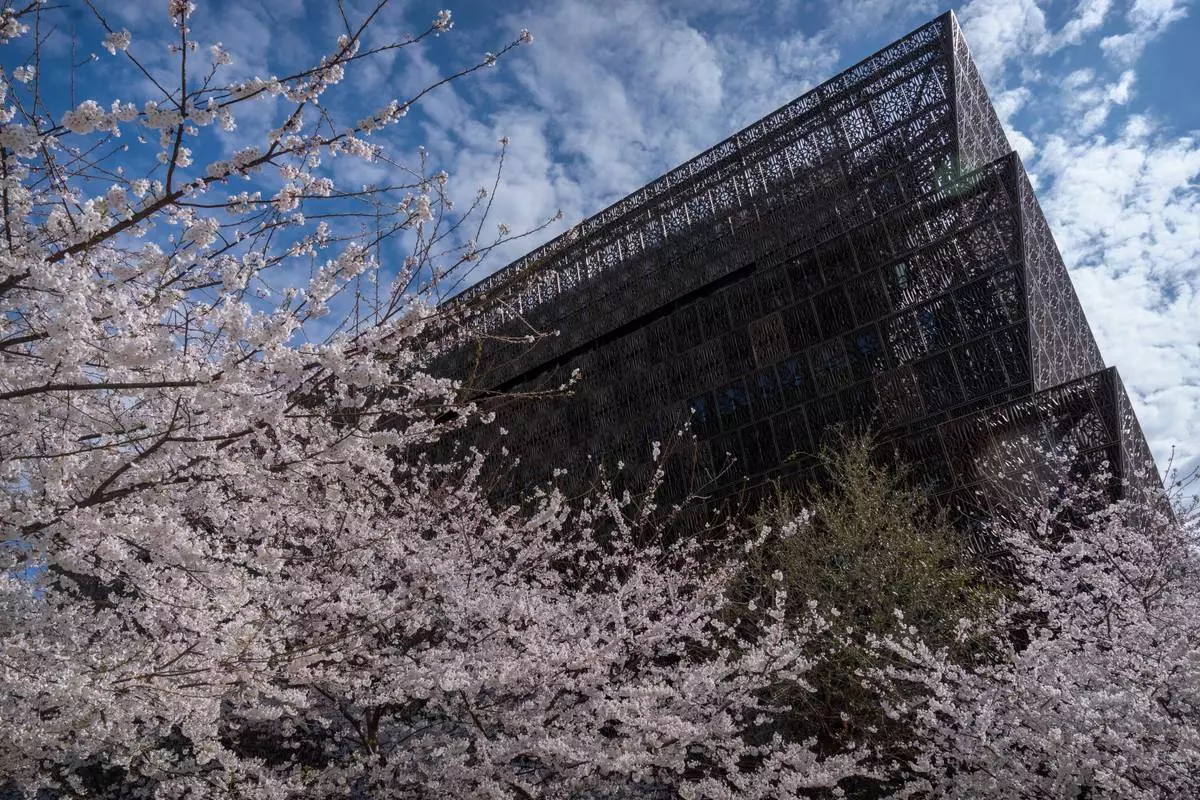
The National Museum of African American History and Culture on the National Mall is seen on Friday, March 28, 2025, in Washington. (AP Photo/Mark Schiefelbein)
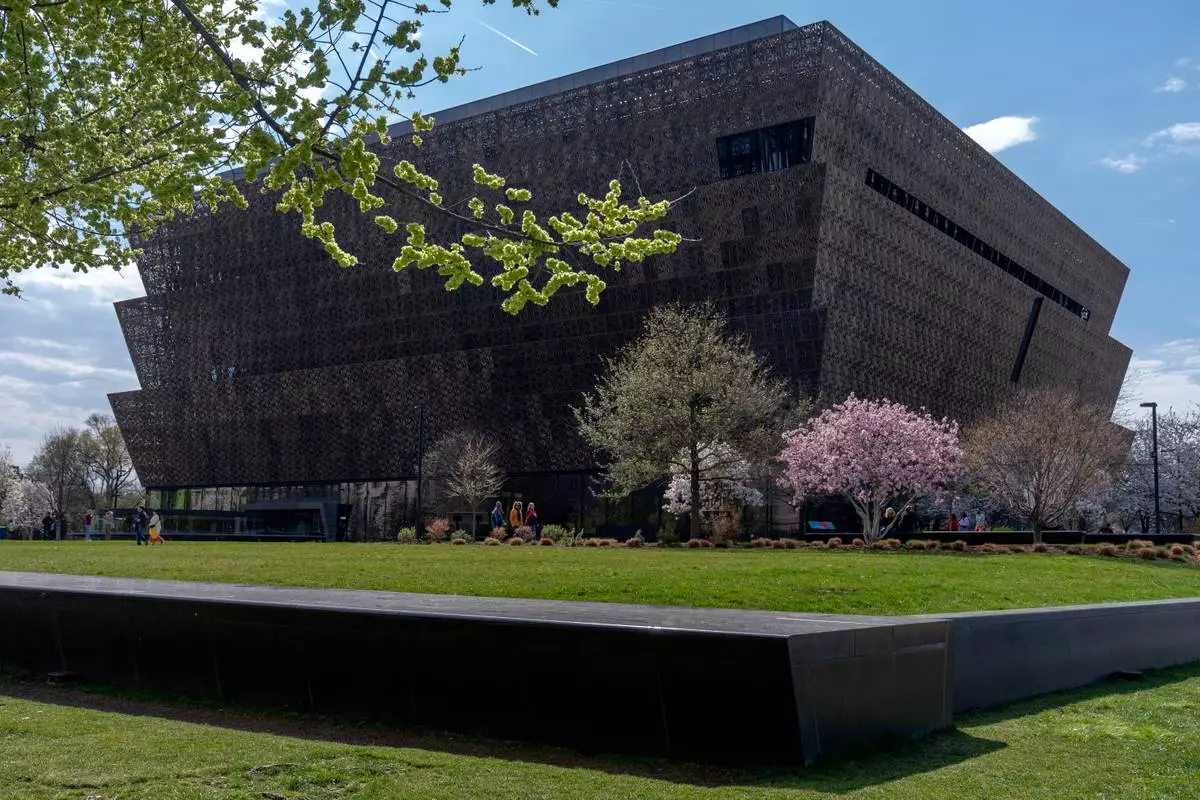
The National Museum of African American History and Culture on the National Mall is seen on Friday, March 28, 2025, in Washington. (AP Photo/Mark Schiefelbein)









